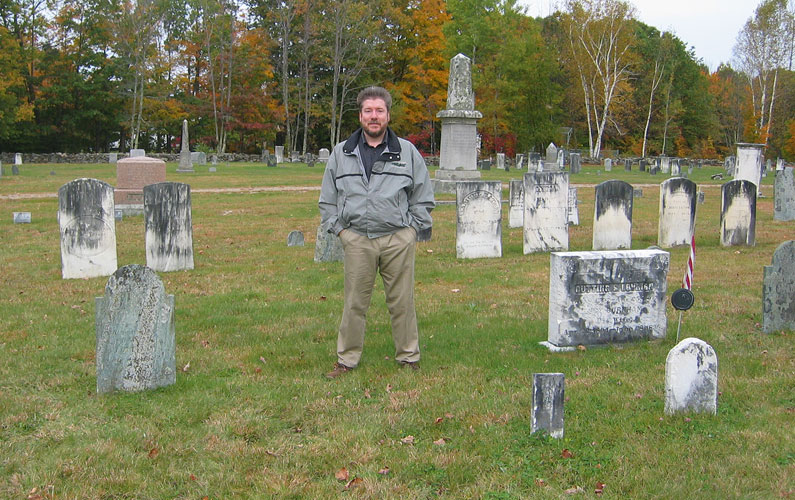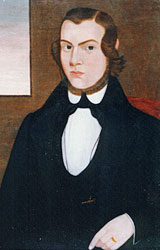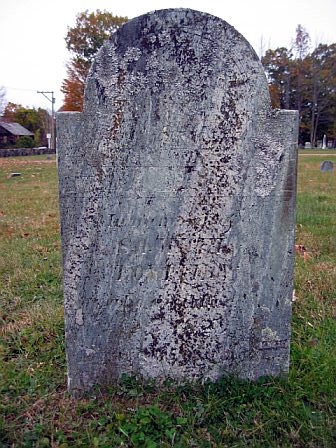Before I began genealogy work in the 1990’s, I was told that Lovrien (we pronounce it “Luv-rin”) was French, probably because it looks French and rumors of early ties to Canada. No one was sure of the origin of the name or who the emigrant ancestor was. Does Lovrien mean anything in French? No. There are no Lovriens in the phonebooks of France. Could it be a geographical name, like Lorraine? If you look in an atlas, you’ll find a town called Louvain in Belgium and a village in Slovenia named Lovrin. There are actually a few Lovrin families of Slovenian descent in the U.S., but they are no relation to the Lovriens. It wasn’t until Cyril Goodell (a Lovrien genealogist) came into contact with Elinor Kelley of New Hampshire (a Lovering family genealogist) that the true origin of the name was discovered.
From the American Revolution through the first part of the nineteenth century, misspelling of names was very common. Even county officials and census takers resorted to phonetic “guesses” due to high rates of illiteracy and difficulties in tracking families during their migration westward. The probate records for George Washington Lovrien (pictured, 1821-1854) show his name spelled three different ways – in one document! Similarly, the vital records for George’s father Peter (1788-1857) show the spellings Loveren (birth), Lovering (marriage) and Loverin (death), though at least one document he signed himself uses the Lovrien spelling.
Samuel, our heroic but illiterate ancestor
Samuel Lovrien (1754-1829) fought in the American Revolution in Capt. Ebenezer Webster’s Company, Col. Stickney’s Regiment (New Hampshire). He is listed in the DAR Patriot Index under this spelling. For some reason the spelling was retained, possibly due to family pride in Samuel’s military service. Samuel listed his father as Samuel Lovrien (born 1730), but all references before this time use the name Lovering (an English name, of course, and not French at all). The ancestors of Samuel can been traced back to John Lovering, who is believed to have sailed from Wales to New Hampshire around 1645.
Samuel and his wife Mehitable (Rowe) had ten children. Nine were boys: Moses, John, Joseph, Benjamin, Peter, William, Cutting Stephen, Daniel and Luke. All of the Lovriens of the U.S. and Canada are likely descended from these sons. Today there are three known branches of the Lovrien family. The rest have apparently “daughtered out,” meaning that no male descendants were born or had children. In 1986, Gladys Lovrien Lasser completed a genealogy of over 800 descendants of George Washington Lovrien (Samuel’s grandson through his son Peter). There are also many descendants of Joseph Lovrien (born 1810) still alive, mainly in Minnesota, and a few descendants of Charles Harrison Lovrien (1836-1900) (Samuel’s grandson through his son Luke) living in Arkansas.
It is easy to see how the name could be spelled as Loverin by dropping the final “g”, or interpreted phonetically as Loveren or Loveran (especially when with an English and/or New England accent!). And at some point over 200 years ago, someone wrote down “Lovrien” for some reason, and here we are. I hope that my research and collaboration with other family genealogists will help fill out the family history even further.
Then what is the origin of the name “Lovering”?
According to the Dictionary of American Family Names (Oxford University Press, ISBN 0-19-508137-4), Lovering comes from the Old English “Leofhering” (son of Leofhere) meaning “beloved warrior”. This name can be traced back to England as far as 1086 A.D. The surname Levering (and several others) stem from this original root.
Other possibilities:
Is there a Lovrien coat of arms?
 Although no coat of arms is registered for the name Lovering, there is an English probate document from 1703 which contains a seal that may be associated with the family in some way (I have reproduced it at left): “on a bend, three martlets, on a canton in the sinister chief, a rose”. Although we have no proof of these arms being associated with the Loverings of Suffolk, there is at least one positive clue. The rose in the sinister chief (upper left) is an extra symbol (or “mark of cadency“) denoting the 7th son of the original arms bearer. According to William Lovering, a Lovering genealogist from Massachusetts, the probate document in question was filed by David Loverin, the 7th son of William Loveran (born 1600) apothecary of Devon, Cornwall.
Although no coat of arms is registered for the name Lovering, there is an English probate document from 1703 which contains a seal that may be associated with the family in some way (I have reproduced it at left): “on a bend, three martlets, on a canton in the sinister chief, a rose”. Although we have no proof of these arms being associated with the Loverings of Suffolk, there is at least one positive clue. The rose in the sinister chief (upper left) is an extra symbol (or “mark of cadency“) denoting the 7th son of the original arms bearer. According to William Lovering, a Lovering genealogist from Massachusetts, the probate document in question was filed by David Loverin, the 7th son of William Loveran (born 1600) apothecary of Devon, Cornwall.



Fascinating. Thank you, David!
I’d be I interested in discovering more details! My maiden name is Lovering and I have traced my family history back to Moses Lovering (Lovrien).
Hi there, Although I have not actively researched the Loverings/Loverins for decades, I do have a large repository of information on the entire family. I noticed your family line because your ancestor Moses was a half-brother to my 4th great grandfather John Prescott Lovering. I have records of both of their families, including vital records and deeds.
Elinor Kelley
Thanks for stopping by Elinor – you’ve given me so much wonderful info through the years. Can’t thank you enough!